 | Benjamin Greenleaf - Algebra - 1879 - 322 pages
...following theorems give rise to formulas, useful in abridging algebraic operations. THEOREM I. 76. The square of the sum of two quantities is equal to...square of the first, plus twice the product of the first by the second, plus the square of the second. For, let a represent one of the quantities, and... | |
 | Shelton Palmer Sanford - Algebra - 1879 - 348 pages
...to do so. A PROBLEM is a question proposed for solution; i. a something to be done. TIIEOEEM I. 67. The square of the SUM of two quantities is equal to the square of the first, plus twice lhe product of the first by the second, plus the square of the second. Ex. 1. What is the square of... | |
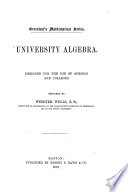 | Webster Wells - Algebra - 1879 - 468 pages
...= (a + V) (a + I) ; whence, by actual multiplication, we have That is, (a + bY = a? + 2ab + b2. (1) The square of the sum of two quantities is equal to the square nf the first, plus twice the product of the first by the second, plus the square of the second. 105.... | |
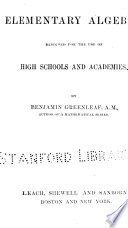 | Benjamin Greenleaf - Algebra - 1879 - 350 pages
...following theorems give rise to formulas, useful in abridging algebraic operations. THEOREM I. 76, The square of the sum of two quantities is equal to the tguare of the first, plus twice the product of the first by the second, plus the square of the second.... | |
 | Webster Wells - Algebra - 1880 - 498 pages
...= (a + b) (a + b) ; whence, by actual multiplication, we have That is, (a + b)2 = a2+2ab + b2. (1) The square of the sum of two quantities is equal to the square of the first, plus t1cice the product of the first by the second, plus the square of the second. 105. We may also show,... | |
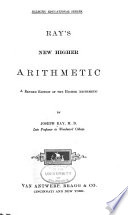 | Joseph Ray - Arithmetic - 1880 - 420 pages
...operations illustrate the following principle : PRINCIPLE. — The square of the sum of two numbers is equal to the square of the first, plus twice the product of the first by the second, plus the square of the second. Thus : Show by involution, that : \. (5)2 equals... | |
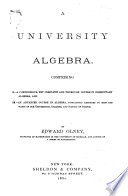 | Edward Olney - Algebra - 1880 - 354 pages
...THEO. — The square of the difference of two quantities is equal to the square of the first, minus twice the product of the two, plus the square of the second. 87. THEO. — The product of the sum and difference of two quantities is equal to the difference of... | |
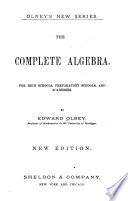 | Edward Olney - Algebra - 1881 - 506 pages
...also (m+n)(m+n) — (m— n)(m— n). Last result, 4ww. THEEE IMPORTANT THEOREMS. .94. Theorem. — The, square of the sum of two quantities is equal...product of the two, plus the square of the second. Demonstration. — Let x be any one quantity and y any other. The sum is x+y; and the square is, the... | |
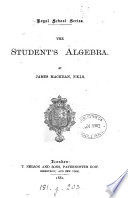 | James Mackean - 1881 - 510 pages
...much simplified and shortened. I. Multiply а + b by itself. а + b а + b a2+ ob ab + b2 . That is, the square of the sum of two quantities is equal to the sum of the squares of the quantities increased by twice their product. II. Multiply а - b by itself.... | |
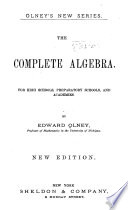 | Edward Olney - Algebra - 1881 - 504 pages
...Demonstration. — Let x be any one quantity and y any other. The sum is x + y ; and the square is, the square of the first, «*, plus twice the product of the two, 2xy, plus the square of the second, y\ That is (x+y)* = x' + Zxy+y*. For (x+yy = (x+y) (x+y) which... | |
| |